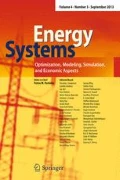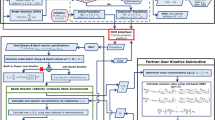Abstract
Energy efficiency is today the main issue for any yeast production company. Portuguese yeast companies are not an exception. Purely replacing some equipment with more energy efficient ones surely contributes to decrease the overall energy consumption, but it is not enough. A yeast production process needs to be characterized and analyzed as a distributed and resource-constrained system. To achieve that in a Portuguese yeast factory, a suitable solution to obtain a dynamic resource-constrained process scheduling was pursued. A genetic algorithm (GA) based scheduling system was used to scheduling optimization of factory’s fermentation units to minimize their specific cost at yeast production. Numerical simulations were first effectuated for calibration and validation of the yeast production model developed. A 2.29% reduction in the electricity cost per ton and per week of yeast production was achieved, which means about 7500 euros/year if the level of optimization is maintained.

















Similar content being viewed by others
References
Mazinan, A.H., Khalaji, A.R.: A comparative study on applications of artificial intelligence-based multiple models predictive control schemes to a class of industrial complicated systems. Energy Syst. 7(2), 237–269 (2016)
Guo, Z.C., Fu, Z.X.: Current situation of energy consumption and measures taken for energy saving in the iron and steel industry in China. Energy 35(11), 4356–4360 (2010)
Rodriguez-Gonzalez, O., et al.: Energy requirements for alternative food processing technologies—principles, assumptions, and evaluation of efficiency. Compr. Rev. Food Sci. Food Saf. 14(5), 536–554 (2015)
Roos, Y.H., Fryer, P.J., Knorr, D., Schuchmann, H.P., Schroën, K., Schutyser, M.A., Windhab, E.J.: Food engineering at multiple scales: case studies, challenges and the future–a European perspective. Food Eng. Rev. 8(2), 1–25 (2015)
Therkelsen, P., Masanet, E., Worrell, E.: Energy efficiency opportunities in the US commercial baking industry. J. Food Eng. 130, 14–22 (2014)
Khadgi, P., et al.: A simulation model with multi-attribute utility functions for energy consumption scheduling in a smart grid. Energy Syst. 6(4), 533–550 (2015)
Hecker, F.T., Stanke, M., Becker, T., Hitzmann, B.: Application of a modified GA, ACO and a random search procedure to solve the production scheduling of a case study bakery. Expert Syst. Appl. 41(13), 5882–5891 (2014)
Olszewski, P.: Genetic optimization and experimental verification of complex parallel pumping station with centrifugal pumps. Appl. Energy 178, 527–539 (2016)
Shabana, S., Sudhakar, K., Meghavatu, D.: Energy audit, designing, and management of walking beam reheating furnace in steel industry. In: Chemical and Bioprocess Engineering: Trends and Developments, p. 241 (2015)
Holland, J.: Adaptation in Natural and Artificial Systems. MIT Press, Cambridge (1992)
de Weck, O.: OCW, Lecture Notes, An introduction to genetic algorithms [PowerPoint slides]. Massachusetts Institute of Technology, Cambridge (2010)
Mitchell, M.: An Introduction to Genetic Algorithms. A Bradford Book, 5th edn. The MIT Press, Cambridge (1999)
Acknowledgements
This work was supported by Fundaçã para a Ciência e Tecnologia (FCT), through IDMEC, under LAETA, projec. The work of S. Vieira was supported by Programa Investigador FCT (IF/00833/2014), cofounded by the European Social Fund through the Operational Program Human Potential.
Author information
Authors and Affiliations
Corresponding author
Rights and permissions
About this article
Cite this article
Faria, G., Vieira, S. & Branco, P.J.C. Evolutionary process scheduling approach for energy cost minimization in a yeast production factory: design, simulation, and factory implementation. Energy Syst 10, 113–139 (2019). https://doi.org/10.1007/s12667-018-0275-y
Received:
Accepted:
Published:
Issue Date:
DOI: https://doi.org/10.1007/s12667-018-0275-y




